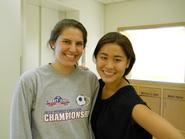
Speech comprehension and production are such common tasks that most people do not even realize they are doing it. In fact, for most adults speech seems relatively simple. For neurologists, however, speech comprehension and formation are not just highly complex, but highly debatable topics.
This past year Jane Hannon ’11 completed her senior thesis in neuroscience. As part of her project she ran a pilot study concerning speech and the parts of the brain that affect it. This summer Alexandra Arenson ’13 and Charlotte Cosgrove ’13, both neuroscience majors, will work with Assistant Professor of Psychology Jeremy Skipper to reorganize and refine Hannon’s thesis, adding more detail and including more test subjects. Their project, “The Phantom Text Effect,” concerns the processes of speech comprehension in the brain among adult English speakers.
The team will work to support the New Model of Language, which states that language comprehension and speech production cannot be pinpointed to one specific area of the brain, but rather these functions are highly complex and involve many different areas of the brain.
The Old Model, by comparison, assigned comprehension to Wernicke’s area and speech production to Broca’s area in the brain. Arenson and Cosgrove will work with sentence structure, exploring the role of aspects such visual cues and environmental aspects in speech comprehension. They will investigate how “priming effects,” or prior reading of a sentence, or mouth movement of the speaker, affect language comprehension. They aim to disprove the Old Model of Language by demonstrating that many areas of the brain can be affected by speech.
Arenson first became interested in this type of research after taking Professor Skipper’s Brain and Behavior course, after which she wished to continue in this type of work. She looks forward to the new experiences that await her, meeting new people, and using the advanced technology available to them.
For example, to aid in their research, Arenson, Cosgrove and Skipper will employ an EEG machine, which takes sensitive readings of the parts of the brain that certain stimuli trigger. The devise picks up on electrical impulses through electrodes on the scalp which can then be translated into data that researchers can interpret. Cosgrove looks forward to using the machine and seeing the results of her own efforts, rather than interpreting a given set of data. Currently, the group is working on reformatting Hannon’s data for use in their own project.
Both Arenson and Cosgrove participate in Hamilton athletics; Arenson plays tennis while Cosgrove is on the soccer team. The two enjoy sports and are sisters of the sorority Alpha Theta Chi, and both women plan to attend medical school after college.
Arenson and Cosgrove’s studies in speech comprehension and formation can help shed light on an expanding and ever-changing field. By adapting and expanding Hannon’s senior thesis, they hope to learn more about a topic that fascinates them. Their work requires precision, attention to detail, and dedication, despite how simple speech may appear at first.
Alexandra Arenson is a graduate of the Latin School of Chicago. Charlotte Cosgrove is a graduate of Chatham High School ( N.J.).
Posted May 24, 2011
